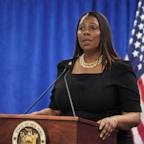ANALYSIS: Trump seeks out divisions to heal himself
In Phoenix, Trump sought out fault lines and cleaved them towards more division.
— -- Healing, Donald Trump-style, is a curious thing. If Tuesday night is any indication, it involves anger, divisiveness, self-pity, misleading and downright false statements, as well as a reopening of sensitive wounds.
Those are among takeaways from the epic campaign speech President Trump delivered in Phoenix. At a tense moment for a nation facing challenges at home and abroad, Trump sought out the nation’s fault lines and cleaved them toward more division, not less.
He offered a tour-de-force of coded language, deceptive arguments, and curious political battles to his audience. Trump seemed to be enjoying himself, calculating that he can thrive on the devotion of his followers, even if their numbers may be diminishing.
“You know where my heart is,” he told a crowd that seemed to feed his energy.
It’s been a whirlwind week for Trump, just in terms of the tone he offers in public statements. Monday was somber and statesmanlike, for the most part, as he issued a national call for unity as he announced an Afghanistan strategy that will send more U.S. troops to war.
The president hit similar notes today, telling a crowd of veterans that their sacrifice can serve as an example for all Americans.
“We are here to draw inspiration from you as we seek to renew the bonds of loyalty that bind us together as one people and one nation,” he said.
But that Trump was nowhere to be found a night earlier. In that speech, Trump brushed past the damage he did to himself with his response to Charlottesville, omitting the language -- “good people,” “both sides” -- that got him in trouble with his own party.
He hinted strongly at pardoning a racially divisive former sheriff. He threatened a government shutdown over the border wall. He blasted Arizona’s two Republican senators, even while pointing out that his own aides asked him not to mention their names.
And the president suggested that members of the news media are un-American for reporting on his reactions to Charlottesville.
"These are truly dishonest people," he said. "They're bad people. I really think they don't like our country."
Trump’s feud with the news media has long had an element of shtick. But his language could have consequences, and that language was undeniably misleading. He even wrongly said that TV cameras filming the event were being shut off, despite the fact that the major cable networks were taking it live.
Trump is seeking out conflicts because of how it tends to unite his base. The targets, in this case, include the news media as well as many of the Republican lawmakers he needs to advance his agenda.
It would seem counterproductive -- but that might misunderstand how Trump approaches the presidency. He’s made clear that he considers himself -- his own personality, ego, and predilections -- central to his performance of the job.
To Trump, what he views as unfair treatment of himself is tied to his base. While most previous presidents seek to heal divisions, that’s why Trump is more inclined to play them up.
“The media can attack me,” he said Tuesday night. “But where I draw the line is when they attack you, which is what they do -- when they attack the decency of our supporters.”




